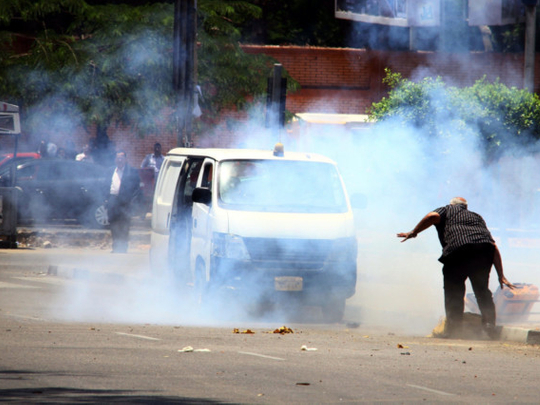
Cairo: The unrest, which has gripped Egypt since the army’s overthrow of Islamist president Mohammad Mursi a year ago, is likely to continue as the country grapples with economic woes and violence, according to political analysts.
“The first anniversary of Mursi’s removal comes as hundreds of young people, who participated in the revolutions against Mursi and (his predecessor Hosni) Mubarak, languish in prisons,” Waheed Abdul Majuid, an expert at the state-run Al Ahram Centre for Strategic Studies, said.
“This crackdown has alienated many youth, who saw this as targeting the figures who participated in the (2011) revolution against Mubarak.” Several secular pro-democracy activists have been jailed in recent months on charges of violating a law restricting public protests.
They include Ahmad Maher, Alaa Abdul Fattah and Ahmad Douma — iconic activists who mobilised the uprising that forced Mubarak out of power in early 2011. The trio were also vocal opponents of Mursi and his Muslim Brotherhood.
The army deposed Mursi on July 3, 2013 following enormous street demonstrations against his troubled one-year rule.
“Also marginalised in the past year is the National Salvation Front (NSF), which was the major force behind the revolution against Mursi,” Abdul Majuid said, referring to a coalition of liberal and leftist politicians formed in late 2012 in reaction to Mursi’s decision to make his decrees beyond judicial oversight.
“The comeback of the foes of the revolution against Mubarak to the political scene would not have been possible if the National Salvation Front had developed its role and pushed for the implementation of the revolutionary objectives of freedom, social justice and preserving human dignity.”
Following Mursi’s removal, Nobel Peace Prize winner Mohammad Al Baradei, an NSF co-founder, was appointed as vice president. Less than two months later, Al Baradei quit protesting security forces’ deadly crackdown on two pro-Mursi camps in Cairo.
Hundreds have since been killed in street clashes pitting police and Mursi’s opponents against his backers. Nearly 700 security personnel have, meanwhile, been killed in a series of attacks blamed on Islamist insurgents.
Thousands of Mursi’s followers have been rounded up and tried on charges of inciting or involvement in deadly violence.
Amnesty International reported on Thursday a surge in arbitrary arrests, detentions and incidents of torture and deaths in police custody, saying this provides “strong evidence of the sharp deterioration in human rights in Egypt” since Mursi’s toppling.
According to WikiThawra, an initiative run by the Egyptian Centre for Economic and Social rights, at least 80 people have died in custody and more than 40,000 people were detained or indicted between July 2013 and mid-May 2014.
“The transition has not been smooth,” Fawzi Hossam, a political expert, said. “I agree with those saying that Egypt has paid a heavy price for removing Mursi. But his Muslim Brotherhood bears the major part of blame for this,”he added.
“The Brotherhood has ignored Egyptians’ resentment of its inefficient rule and continued to mobilize its supporters to disrupt Egyptians’ life and stabilise the country.”
The Islamist group has been in the past year the target of the toughest security clampdown in its 86-year history.
“Despite everything, Egyptians have succeeded in making two major achievements, namely rewriting the constitution and holding presidential elections. The implementation of the roadmap (a formula announced by the army following Mursi’s removal) will be crowned later this year with the holding of parliamentary elections,” Hossam said.
Incumbent President Abdul Fattah Al Sissi, who led Mursi’s overthrow, has vowed that the Brotherhood will have no existence in his era, fuelling expectations of a longer crackdown.
Al Sissi, who took office last month after securing a landslide win in the presidential vote, has pledged to re-establish security and reinvigorate the ailing economy.
“In view of his military background, Al Sissi is competent enough to restore security,” said Hossam. “He will become more popular, mainly with young people, if he scraps the controversial Protest Law and pardon political detainees. Still, his task of fixing the economy will not be so easy.”
Al Sissi has recently hinted at painful austerity measures, including slashing state subsidies on energy, to curb a ballooning budget deficit. This week he approved a revised state budget draft envisaging a deficit of 10 per cent compared to 12 per cent in the budget of the past fiscal year.
The cash-strapped government has, meanwhile, unveiled a package of tax reforms aimed at replenishing state coffers.
“Restructuring the economy is a necessary step. But Al Sissi must be careful not to make the poor, who heavily depend on subsidies, pay the price. This can lead to trouble even from Al Sissi’s backers, who still see him as able to make their lives better,” Hossam said.












